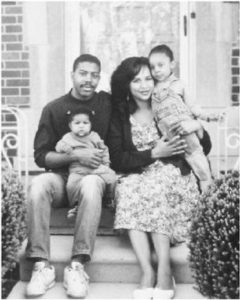
J.D. & Ethel Shelly and Family
*On this date in 1948, the United States Supreme Court rendered its landmark decision in Shelley v. Kraemer. Holding, by a vote of 6 to 0 (with three judges not sitting), the court ruled that courts cannot enforce racially restrictive covenants since this would constitute state action denying due process of law in violation of the 14th Amendment to the Constitution.
The case arose from a conflict surrounding the sale of a house on the 4600 block of Labadie Avenue in a quiet residential community in St. Louis. In 1945, 39 white families lived in the 39 homes on Labadie between Taylor Avenue and Cora Avenue. Though houses turned over, as houses do, the community maintained a relatively stable sense of cohesion with little outside pressure and no national attention. And residents liked it that way.
Everything changed in September of that year when Louis and Fern Kraemer put their house up for sale. The duplex, selling for $5,700, attracted many potential buyers, including J.D. and Ethel Shelley, a black couple who had moved from Mississippi to Missouri a few years earlier. The Shelleys spoke to Elder Robert Bishop, their pastor at the Church of God in Christ, and learned that he also worked in real estate. Bishop showed the couple the Kraemers' Labadie Avenue property. They made an offer, and it was accepted. Bishop secured the home on behalf of the Shelleys, placing it in his wife's name.
"Unknown to both parties, the home was subject to a restrictive covenant dating back to 1911 that precluded the use of the property by"any person not of the Caucasian race" According to the deed," people of the Negro or Mongolian race” were forbidden from using or occupying the property, or contracting to purchase the property, for fifty years after the original covenant had gone into effect. As a marker of how pervasive restrictive covenants had become, three justices were forced to recuse themselves when they learned that their deeds included such a provision. "Unknown to both parties, the home was subject to a restrictive covenant dating back to 1911 that precluded the use of the property by “any person not of the Caucasian race.”
According to the deed, “people of the Negro or Mongolian race” were forbidden from using or occupying the property or contracting to purchase the property, for fifty years after the original covenant had gone into effect. As a marker of how pervasive restrictive covenants had become, three justices were forced to recuse themselves when they learned that their deeds included such a provision.
On January 16, 1948, the remaining six justices issued a unanimous opinion vindicating the Shelleys' struggles. Although the case did not violate outlaw covenants (only a state's enforcement of the practice), in Shelley v. Kraemer, the Supreme Court strongly reinforced the 14th Amendment's guarantee of equal protection under the law, which includes rights to acquire, enjoy, own, and dispose of property. The Shelley case was a heartening signal for African Americans that positive social change could be achieved through law and the courts.